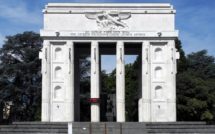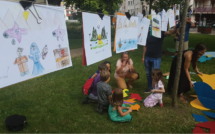
Teaching Migration in a Liberal Arts Setting: Reflections from Bard College Berlin

An introduction to our Campus Spotlight on Bard College Berlin.
Bard College Berlin (BCB) is a liberal arts university located in Berlin’s district of Pankow. True to the principles of liberal arts education, BCB offers interdisciplinary programs in the humanities and social sciences, with a strong focus on the development of essential writing and thinking skills. With its international student body currently counting 270 students from 60 different countries, BCB is an institution continuously shaped by diversity and migration. Starting in 2015, BCB’s international student body has been further extended, owing to the Program for International Education and Social Change (PIESC) aimed at young individuals from regions of crisis or conflict. The 32 PIESC students currently enrolled at Bard College Berlin come from Syria, Afghanistan, Iraq, Eritrea, Palestine, Greece, and Brazil and together comprise 12 percent of the total student population. Further perspectives are brought in through the Open Society Foundation-funded blended learning initiative on campus. **Additionally, Bard College Berlin is a study-abroad site for the Mellon-funded Consortium on Forced Migration, Displacement, and Education, which has allowed for an expansion of curricular offerings.
As nearly every student and the majority of the faculty have moved across borders to arrive in Berlin, migration is a norm rather than an exception on BCB campus. That is not to say, however, that migration works equally as a common denominator for everyone in the BCB community: our individual experiences of migration differ greatly from each other as they are in various ways shaped by citizenship, class, gender, race, religion, sexuality, and health. In order to better understand how migration forms us (individually and collectively), and to inquire into the workings of migration locally and internationally, BCB faculty designed a range of classes that approach the topic of migration from various disciplinary perspectives. Drawing on contributions from global social theory through visual arts and creative writing to archival research, students engage critically with migration and, in the process, produce art pieces, essays, podcasts, debates, and performances.
Outside the classroom, students get involved in a range of projects and initiatives supported by the Civic Engagement Initiative and the Berlin Internship Program. One of such initiatives, Campus Conversations, provides a platform for discussions, learning, and exchanges between students, neighbors, and all interested Berliners. Held in German or English, but open to other languages as well, Campus Conversations pick a different thematic focus for each meeting, ranging from the German elections through climate change to the LGBTQI alphabet. Students are encouraged to develop their own student-run initiatives to contribute to a positive social change in the local and global community. Student projects have focused on building the first Arabic library Baynatna in Berlin, offering to teach their native languages to the community, or employing social and medical clowning techniques in their work with children in their communities. Students involved in the civic engagement initiatives meet regularly with their peers from across the Bard network at international conferences and trainings, where they develop, test, and evaluate new forms of local and global engagement.
Aside from short statements written by Bard College Berlin faculty about the migration-related courses they teach, as well as full syllabi, this Campus Spotlight section features several Bard College Berlin students’ visual responses to the question: What is Europe now?
Agata Lisiak is Professor of Migration Studies and Academic Director of the Internship Program at Bard College Berlin. Agata works at the intersections of migration studies, urban sociology, visual cultures, and gender studies, and has published on migrant mothering, urban girlhood, walking in the city, Taiwanese cinema, Polish hip hop, cultural memory in post-socialist cities, and invisible femininities, among many other topics. Together with Elena Vacchelli, Agata is co-founder of migART: a platform showcasing activist, research, and teaching projects that creatively and collaboratively engage with migration.
Bard College Berlin is part of the Mellon-Funded Consortium on Forced Migration, Displacement, and Education.
Published on April 2, 2019.
Photo: World map dated from the mid 1800’s showing Western and Eastern Hemispheres with hand colouring | Shutterstock




